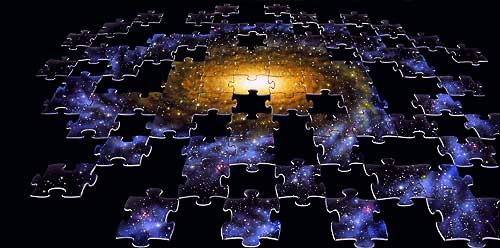
How will our universe end? Recent speculation now includes a pervasive growing field of mysterious repulsive phantom energy that rips virtually everything apart. Although the universe started with a Big Bang, analysis of cosmological measurements allows a possibility that it will end with a Big Rip. As soon as few billion years from now, the controversial scenario holds, dark energy will grow to such a magnitude that our own Galaxy will no longer be able to hold itself together. After that, stars, planets, and then even atoms might not be able to withstand the expansive internal force. Previously, speculation on the ultimate fate of the universe centered on either a re-collapsing Big Crunch or a Big Freeze. Although the universe's fate is still a puzzle, piecing it together will likely follow from an increased understanding of the nature of dark matter and dark energy.
Phantom Energy and Cosmic Doomsday
Authors: Robert R. Caldwell, Marc Kamionkowski, Nevin N. Weinberg
Submitted on 25 Feb 2003
Abstract: Cosmologists have long wondered whether the Universe will eventually re-collapse and end with a Big Crunch, or expand forever, becoming increasingly cold and empty. Recent evidence for a flat Universe, possibly with a cosmological constant or some other sort of negative-pressure dark energy, has suggested that our fate is the latter. However, the data may actually be pointing toward an astonishingly different cosmic end game. Here, we explore the consequences that follow if the dark energy is phantom energy, in which the sum of the pressure and energy density is negative. The positive phantom-energy density becomes infinite in finite time, overcoming all other forms of matter, such that the gravitational repulsion rapidly brings our brief epoch of cosmic structure to a close. The phantom energy rips apart the Milky Way, solar system, Earth, and ultimately the molecules, atoms, nuclei, and nucleons of which we are composed, before the death of the Universe in a ``Big Rip''.
Title: Is the universe inflating? Dark energy and the future of the universe
Authors: Huterer, Dragan; Starkman, Glenn D.; Trodden, Mark
Abstract
We consider the fate of the observable universe in the light of the discovery of a dark energy component to the cosmic energy budget. We extend results for a cosmological constant to a general dark energy component and examine the constraints on phenomena that may prevent the eternal acceleration of our patch of the universe. We find that the period of accelerated cosmic expansion has not lasted long enough for observations to confirm that we are undergoing inflation; such an observation will be possible when the dark energy density has risen to between 90% and 95% of the critical. The best we can do is make cosmological observations in order to verify the continued presence of dark energy to some high redshift. Having done that, the only possibility that could spoil the conclusion that we are inflating would be the existence of a disturbance (the surface of a true vacuum bubble, for example) that is moving toward us with sufficiently high velocity, but is too far away to be currently observable. Such a disturbance would have to move toward us with speed greater than about 0.8c in order to spoil the late-time inflation of our patch of the universe and yet avoid being detectable.